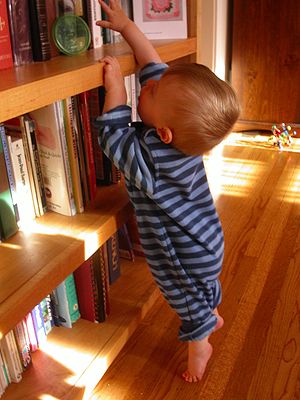Parenting
Reading the baby's mind
Reading a child's mind is a foremost task of parenthood.
Posted May 3, 2010
Image via Wikipedia
In my last post, I called for a little skepticism about claims that we can make ourselves better parents, or change much about our children's development, by following the advice in parenting books. I'm certainly not suggesting that parents don't matter. What's at issue is whether parents and children benefit from conscious, deliberate strategies to change parenting styles, when they could instead be concentrating on the commonsense tasks of being a mom or dad. And, of course, the parents who really cause problems for children are probably not going to care about what I write in any case.
I wanted to say a bit more about my fifth theme, that of mind-reading, partly because it has been a big part of my own research, and in part because it is one area where parents might be able to consciously and deliberately make a difference to what they do. As I mentioned last time, the kind of mind-reading I'm interested in is not the telepathy sort beloved of sci-fi writers. It's the sort that involves treating an infant as an individual with a mind, and trying to work out what is going on for him or her.
People differ in their willingness (or ability) to put themselves in children's shoes in this way. In one of our studies, we found that some mothers are ready to interpret their babies' behavior in terms of their mental states as early as six months1. We found that mothers' tendencies in this regard—what we call their 'mind-mindedness'—was an important predictor of the security of these babies' attachment to the mother at one year. And we have looked at some longer-term developmental consequences of these individual differences. In two separate samples, we have found that individual differences in maternal mind-mindedness are an important predictor of children's later social understanding2,3. You can read an independent account of this line of research on Gwen Dewar's Parenting Science site. And you can download the coding manual we use for assessing these behaviors, and read more of the background on how we do this kind of research.
For people interested in parenting strategies, the crucial question is whether you can make yourself more mind-minded, and this in turn depends on whether mind-mindedness is a 'natural' trait or a conscious strategy. We don't really know the answers to these questions yet, although we are busily investigating them. One interesting question is how mind-mindedness is affected in parents who suffer from mental illness. I spent a very interesting day at the Institute of Psychiatry in London the other week, helping to run a workshop for clinicians on mind-mindedness and its potential applications to perinatal psychiatry. In our own research on this topic, we have found that mothers with one particular severe mental illness, schizophrenia, behave fairly typically (compared to healthy mothers) in their ability to respond to their babies' cues4. For families affected by other kinds of mental illness, interventions to enhance mind-mindedness might be possible and useful.
Generally speaking, we don't yet know whether we can intervene to make parents more mind-minded, and how any such changes would impact on children's development. These are exciting areas of research for the future.
1 Meins, E., Fernyhough, C., Fradley, E., and Tuckey, M. (2001). Rethinking maternal sensitivity: Mothers' comments on infants' mental processes predict security of attachment at 12 months. Journal of Child Psychology and Psychiatry, 42, 637-648.
2 Meins, E., Fernyhough, C., Russell, J., and Clark-Carter, D. (1998). Security of attachment as a predictor of symbolic and mentalising abilities: A longitudinal study. Social Development, 7, 1-24.
3Meins, E., Fernyhough, C., Wainwright, R., Clark-Carter, D., Das Gupta, M., Fradley, E., and Tuckey, M. (2003). Pathways to understanding mind: Construct validity and predictive validity of maternal mind-mindedness. Child Development, 74, 1194-1211; Meins, E., Fernyhough, C., Wainwright, R., Das Gupta, M., Fradley, E., and Tuckey, M. (2002). Maternal mind-mindedness and attachment security as predictors of theory of mind understanding. Child Development, 73, 1715-1726.
4Pawlby, S., Fernyhough, C., Meins, E., Pariante, C. M., Seneviratne, G., and Bentall, R. P. (in press). Mind-mindedness and maternal responsiveness in infant-mother interactions in mothers with severe mental illness. Psychological Medicine.



